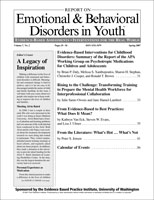Community-Defined Evidence: A Bottom-Up Behavioral Health Approach to Measure What Works in Communities of Color
Author: Ken Martinez, Psy.D..; Linda Callejas, M.A..; Mario Hernandez, Ph.D..
Source: Volume 10, Number 01, Winter 2010 , pp.11-16(6)

< previous article |next article > |return to table of contents
Abstract:
The Community Defined Evidence Project (CDEP) seeks to develop an evidence base that uses cultural and/or community indices to improve availability, quality, and outcomes of behavioral health care for all individuals and families. The CDEP is a response to the growing need to recognize and test community-based practices, culture specific or not, that are being used successfully and the need to establish a means for documenting their positive effects using culturally appropriate and accepted methods of investigation. Community-defined evidence is not meant as a substitute for evidence-based practices that have benefited from the “gold standard” of controlled research. It is offered as an alternative model to describe how evidence can be defined from another paradigm, and as a method for including and validating practices that have emanated from communities from years of outcomes deemed successful by the community.Keywords: community-based practices, community-defined evidence, evidence-base practices, Latino/Hispanic communities, Community Defined Evidence Project, CDEP
Affiliations:
1: Technical Assistance Partnership; 2: Department of Child & Family Studies, Louis de la Parte Florida Mental Health Institute, University of South Florida; 3: Department of Child & Family Studies, Louis de la Parte Florida Mental Health Institute, University of South Florida.